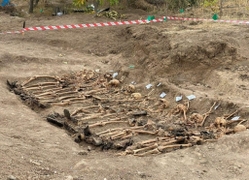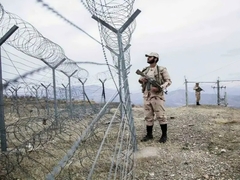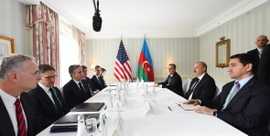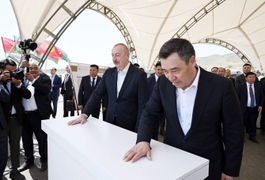Iranian Foreign Minister Hossein Amir-Abdollahian informed Ismail Haniyeh, the head of Hamas’s political bureau, that despite significant human losses, Hamas emerged victorious in the Gaza war.
“Although the human losses of the Palestinian nation in the Gaza Strip were very high, bitter and unfortunate, the dimensions of the victory and achievements of the Palestinian nation were much larger,” Amir-Abdollahian stated during a meeting in Doha, Qatar, on November 23.
Amir-Abdollahian also mentioned that Israel had no military achievements on the battlefield and was compelled to negotiate indirectly with Hamas for a ceasefire and the release of hostages.
In response, Haniyeh thanked Iran for its “decisive support” and diplomatic efforts leading to the temporary ceasefire, describing it as a “political victory based on the victory of the resistance Gaza factions on the battlefield.” Haniyeh also praised the support of Iran-backed groups in Lebanon, Yemen, Iraq, and Syria, considering it “a clear message” to Israel and the US.
On November 22, Israel and Hamas reached a deal for a four-day pause in fighting and the release of at least 50 women and children held hostage in Gaza, marking a major diplomatic breakthrough after nearly seven weeks of conflict. The truce went into effect on November 24, with hostages held by Hamas released in exchange for Palestinian women and children in Israeli jails, as outlined by key negotiator Qatar in a statement.
US bases in Syria and Iraq have been targeted by Iranian proxies following the outbreak of the Gaza-Israel war, with Tehran denying involvement. Lebanon’s Iran-backed Hezbollah Movement has also exchanged fire with Israel following the Gaza war.
Hezbollah Leader Hassan Nasrallah and Iranian Foreign Minister Hossein Amir-Abdollahian discussed the latest developments in Palestine, Lebanon, and the region, as well as efforts to halt the Israeli offensive on the Gaza Strip during Amir-Abdollahian’s trip to Beirut on November 23.
The Iranian foreign minister arrived in Lebanon on November 22 for an official visit, meeting Lebanese leaders, including caretaker Prime Minister Najib Mikati and Parliament Speaker Nabih Berri, as well as representatives of Palestinian Islamic Jihad (PIJ) and Hamas.
In a meeting with the Lebanese PM, Amir-Abdollahian called for diplomatic efforts to continue ensuring a “complete ceasefire” in Gaza and also urged a change in the US’ policy of “unconditional support” for Israel. Amir-Abdollahian stressed that a lasting ceasefire would help create calm in the region and added that the “situation in the region will be different” if Israeli Prime Minister Benjamin Netanyahu “continues to impose his thoughts on the White House.” He emphasized that Iran was “not seeking to expand the war in the region” because if it wanted to escalate the war, the situation would “completely change.”
In a separate meeting with Lebanese Parliament Speaker Nabih Berri, the Iranian minister stated that Israel “experienced unprecedented domestic collapse” after Hamas’s October 7 attack on Israel, adding that Israel “failed to realize” its goals in the war and had to give in to the temporary truce mediated by Qatar.
In a meeting with Palestinian Islamic Jihad (PIJ) leader Ziyad al-Nakhalah and senior Hamas official Khalil al-Hayya, Amir-Abdollahian praised the “bravery” of the “resistance” groups in the fight with Israel. Meanwhile, addressing the members of the paramilitary Basij volunteer force of the Islamic Revolution Guards Corps (IRGC) on November 23, Iranian President Ebrahim Raisi stressed that the deal between Israel and Hamas on a four-day truce shows that Palestinian militant groups are the “victors on the battlefield.”
“The Palestinian resistance groups, after several stages of the intifada and the stone revolution, have now turned the stone war into a missile war and have reached a point where they feel that they can defeat the Zionist regime [Israel] and this self-confidence of theirs was manifested in the Operation Al-Aqsa Flood,” Raisi said.
The president further added that “at the beginning of the recent war, the Zionist regime announced that their goal was to seize and conquer Gaza, but then when they saw that they could not achieve this goal, they announced that their goal was to ground the resistance, but did they succeed.”
His remarks came a day after Supreme Leader Ayatollah Ali Khamenei described the Hamas militant group as the victor of the war, stating that with its surprise October 7 attack and the subsequent war, Hamas managed to “knock out” Israel “not as a government or a state with many capabilities” but rather “as a combatant group.”
The four-day truce comes amid growing international pressure for more humanitarian support for the people of Gaza, where the number of people killed since October 7 now stands at 14,854, according to information from Hamas authorities in the Strip. Israel declared war on Hamas following the militant group’s bloody October 7 terror attack on its territory, in which more than 1,200 people were killed. Militants are holding more than 200 people captive inside Gaza from mass abductions that day, according to figures from the Israeli military.
Since the 1979 Islamic Revolution, Iran and Israel have been entangled in a proxy conflict. Tehran reportedly provides military and financial support to Hezbollah, as well as Palestinian organizations like Hamas and Islamic Jihad. Nathan Sales, a counterterrorism expert at the US State Department, stated in November 2018 that Tehran allocates approximately $100 million annually to fund Hamas and other Palestinian militant groups.







 Kyrgyzstan has joined the extensive reconstruction efforts in the Karabakh region of Azerbaijan, after a series of mega initiatives were launched b...
Kyrgyzstan has joined the extensive reconstruction efforts in the Karabakh region of Azerbaijan, after a series of mega initiatives were launched b...
 Turkmen President Serdar Berdimuhamedow and British Secretary of State for Foreign Affairs, Commonwealth Affairs, and Development David Cameron dis...
Turkmen President Serdar Berdimuhamedow and British Secretary of State for Foreign Affairs, Commonwealth Affairs, and Development David Cameron dis...
 A draft resolution aimed at preventing the development and deployment of weapons of mass destruction (WMDs) in outer space, co-sponsored by Japan a...
A draft resolution aimed at preventing the development and deployment of weapons of mass destruction (WMDs) in outer space, co-sponsored by Japan a...
 Russia and Ukraine have engaged in direct negotiations facilitated by Qatar to address the exchange of children affected by the ongoing conflict.
Russia and Ukraine have engaged in direct negotiations facilitated by Qatar to address the exchange of children affected by the ongoing conflict.



